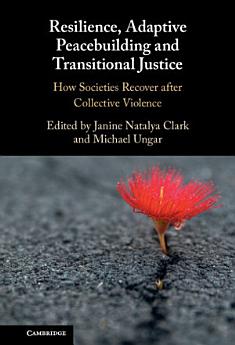Resilience, Adaptive Peacebuilding and Transitional Justice: How Societies Recover after Collective Violence
Janine Natalya Clark · Michael Ungar
oct. 2021 · Cambridge University Press
E-book
309
Pages
reportLes notes et avis ne sont pas vérifiés. En savoir plus
À propos de cet e-book
Processes of post-war reconstruction, peacebuilding and reconciliation are partly about fostering stability and adaptive capacity across different social systems. Nevertheless, these processes have seldom been expressly discussed within a resilience framework. Similarly, although the goals of transitional justice – among them (re)establishing the rule of law, delivering justice and aiding reconciliation – implicitly encompass a resilience element, transitional justice has not been explicitly theorised as a process for building resilience in communities and societies that have suffered large-scale violence and human rights violations. The chapters in this unique volume theoretically and empirically explore the concept of resilience in diverse societies that have experienced mass violence and human rights abuses. They analyse the extent to which transitional justice processes have – and can – contribute to resilience and how, in so doing, they can foster adaptive peacebuilding. This book is available as Open Access.
À propos de l'auteur
Janine Natalya Clark is a Professor of Gender, Transitional Justice and International Criminal Law at the University of Birmingham. She has written three research monographs and her work has been published in a wide variety of journals. She is currently leading a European Research Council-funded research project about resilience and survivors of conflict-related sexual violence.
Michael Ungar is a Family Therapist and Professor of Social Work at Dalhousie University where he holds the Canada Research Chair in Child, Family and Community Resilience. He has published over 200 peer-reviewed articles and 17 books on the subject of resilience for parents, researchers and mental health professionals.
Donner une note à cet e-book
Dites-nous ce que vous en pensez.
Informations sur la lecture
Smartphones et tablettes
Installez l'application Google Play Livres pour Android et iPad ou iPhone. Elle se synchronise automatiquement avec votre compte et vous permet de lire des livres en ligne ou hors connexion, où que vous soyez.
Ordinateurs portables et de bureau
Vous pouvez écouter les livres audio achetés sur Google Play à l'aide du navigateur Web de votre ordinateur.
Liseuses et autres appareils
Pour lire sur des appareils e-Ink, comme les liseuses Kobo, vous devez télécharger un fichier et le transférer sur l'appareil en question. Suivez les instructions détaillées du Centre d'aide pour transférer les fichiers sur les liseuses compatibles.







